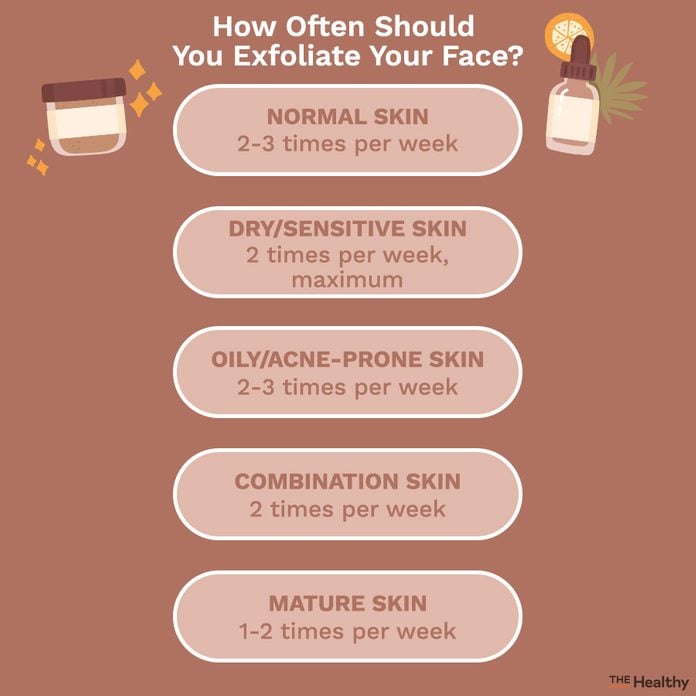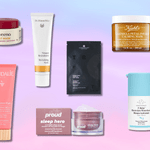Here’s How Often You Should Exfoliate Your Face

Exfoliating is great for your skin—but exactly how often you should exfoliate your face depends on a few factors.
The basics of a good skin care routine include a cleanser, moisturizer, and sunscreen. But most skin care aficionados hoping to attain a glowing complexion also typically include an exfoliator. Doing so is a great way to remove dead skin cells and reveal smoother skin. Yet, one of the most common skin care mistakes people may make is actually over-exfoliation.
In this case, too much of a good thing doesn’t necessarily lead to better results. Exfoliating too much or too often can cause dryness, irritation, and burning. Here’s what dermatologists want you to know about how often you should exfoliate your face, depending on your skin type.
(Related: Are Facial Cleansing Brushes Really Worth It?)
Why you should exfoliate your face
Exfoliating can offer many benefits to your skin, according to board-certified dermatologist Annie Gonzalez, MD, with Riverchase Dermatology in Miami. That’s why it’s a skin care practice to start early. “Exfoliation unclogs the pores, leading to fewer blackheads, evens out the skin’s texture by scraping off dead skin cells, and it encourages cell turnover, which also contributes to vibrant skin,” Dr. Gonzalez says. If the need to “scrape away dead skin cells” doesn’t convince you, get this: We lose 500 million skin cells daily, according to the American Chemical Society.
Other benefits of exfoliating your face include an increase in collagen production which helps strengthen and hydrate the skin, according to Dr. Gonzalez. Regular exfoliation also boosts circulation and promotes lymphatic drainage, reducing puffiness and swelling of the skin, she says. “Exfoliating fights acne, reduces pigmentation, and minimizes the appearance of sun damage and acne scars,” Dr. Gonzalez says. In addition to removing dead skin cells, debris, and unclogging pores, exfoliating your face also reduces oil, according to board-certified dermatologist Morgan Rabach, MD, of LMMedical in New York.

How often you should exfoliate your face
Everyone’s skin is different, so how you should exfoliate may vary from person to person, according to Dr. Gonzalez. She says that exfoliating every day, however, is too much no matter what skin type you have.
Here’s how often you should exfoliate your face, based on your skin type, according to Dr. Gonzalez and Dr. Rabach.
Normal skin
If you have normal skin, exfoliating two to three times a week is an ideal starting point. Take note of how your skin reacts and adjust your exfoliation frequency accordingly. Remember, everyone’s skin is different.
Dry skin or sensitive skin
Dr. Gonzalez and Dr. Rabach recommend exfoliating a maximum of two times a week for people with sensitive or dry skin. “For those with dry skin, it is not a good idea to exfoliate every day,” she says. “If you exfoliate every day, it can leave you with even dyer skin and can strip your skin of its natural oils.” Natural oils keep your skin from losing moisture; moisture keeps your skin hydrated, helps maintain healthy skin cell turnover, reduces the appearance of blemishes, and prevents breakouts.
Dr. Rabach also notes that people with dry or sensitive skin may only want to exfoliate once a week or every other week if they also use other drying and irritating products like serums with acids or retinol. For those with sensitive skin, over-exfoliation can also lead to rashes and redness. Over-exfoliating may also lead to burns or excessively dry skin, increasing sensitivity. So it may be harder, or not possible, to use other active ingredients that are healthy for the skin, like retinols, according to Dr. Rabach.
Oily or acne-prone skin
If you have oily or acne-prone skin, Dr. Gonzalez and Dr. Rabach recommend exfoliating anywhere from two to three times a week. Some people with oily skin may be able to tolerate more frequent exfoliation. “Exfoliating your skin effectively clears up the skin by removing dead skin cells and allows healthier cells to rise to the surface,” Dr. Gonzalez says. “Removing dead skin cells is important because they result in excess oil on the skin that causes acne and clogged pores.” People should “listen” to their skin, Dr. Rabach says. “If it gets overly dry, red irritated, or burns then reduce the number of times you exfoliate,” she says.
Combination skin
For combination skin, Dr. Gonzalez’s answer is similar to sensitive skin. She recommends exfoliating around twice a week, she says. “This can help keep your skin smooth, radiant, and acne-free without over-exfoliating.” Dr. Rabach recommends following up with an oil-free moisturizer.
Mature skin
People with mature skin should opt to exfoliate their face once or twice a week. Aging, hormone changes, stress, and sun exposure can bring about mature skin, according to Dr. Gonzalez. So mature skin may be thin, dehydrated, contain open pores, and have visible wrinkles. Exfoliating one-two times a week keeps the skin tight, improves hyperpigmentation, smooths wrinkles, and corrects dark spots without irritating the skin, she says.
“Be wary of redness and irritation. This may be an indication that you should exfoliate less. Also, look for gentle exfoliators for the skin which reduce the chance of redness or discomfort of the skin,” Dr. Gonzalez says. Mature skin also tends to be drier, so a gentle exfoliator is best, Dr. Rabach agrees.
Other exfoliating advice
The best time to exfoliate
Depending on your skin type and habits, one time of day may be better than the other for exfoliation. If you tend to wear makeup throughout the day, it may be better to exfoliate at night, Dr. Gonzalez says. “Exfoliating at night helps clear out makeup and dirt on the skin,” she says. Exfoliating at night also removes oil and debris from the day. Plus, this deep nighttime cleanse allows other skin care products with active ingredients to soak into the skin overnight, according to Dr. Rabach.
However, if you have oily skin, exfoliating in the morning can help reduce the buildup of dead skin. Exfoliating in the morning also helps your skin look less dull and provides a brighter appearance. “Your skin will tell you what works best for you,” Dr. Gonzalez says.
Wash your face first
You should cleanse your skin first before exfoliating. “By doing this, you are clearing any debris, oil, makeup, sunscreen, or chemicals that may be on your skin,” Dr. Gonzalez says. If you don’t wash your face before, there may be exposure to the dirt and chemicals on your skin. Plus, cleansing also helps keep pores unclogged.
Physical vs. chemical exfoliants
The difference between physical and chemical exfoliants is that chemical exfoliants use chemicals (acids or enzymes) that support cell turnover to remove dead skin cells, according to Dr. Gonzalez. Meanwhile, physical exfoliants (usually face scrubs or brushes) contain small particles or grains that help get rid of dead skin cells.
Examples of physical exfoliants include scrubs that contain salt, sugar, and water-soluble beads, Dr. Gonzalez says. If you want to opt for a physical exfoliant, Dr. Rabach recommends ones that are gentle and safe for the sea. “For example, jojoba beads dissolve so they don’t destroy the ocean,” she says.
In chemical exfoliants, look for AHAs, or alpha hydroxy acids, including lactic acid, malic acid, and glycolic acid. “AHAs help naturally shed the skin,” Dr. Gonzalez says. Chemical exfoliants help dissolve the dead layers of skin, oils, and debris, Dr. Rabach says. Look for ones that are formulated in a gentle way because if they are too strong they can burn the skin, Dr. Rabach adds.
Also, consider salicylic acid, which is a beta-hydroxy acid (BHA). This is ideal for oily or acne-prone skin types. Salicylic acid removes excess sebum on the skin, helping both prevent and treat breakouts, according to the journal Clinical, Cosmetic and Investigational Dermatology.
Can you use multiple exfoliants at one time?
It depends. “I recommend using a physical exfoliant and chemical exfoliant on different days and times,” Dr. Gonzalez says. Rotating them is OK, but don’t use more than one at a time. Using multiple exfoliants may not be beneficial. You want to be gentle with your skin. Contact your dermatologist to discuss which products you are using to see if it is safe to combine them. “Sometimes, combining chemical exfoliants can provide an abundance of benefits,” Dr. Gonzalez says. “However, there is a risk of irritating the skin if you mix certain chemicals together.”
The bottom line
Exfoliation is an important step in your skin care routine. How often you should exfoliate your face depends on your skin type, but dermatologists agree that exfoliating daily is too much. In fact, no matter your skin type, dermatologists don’t recommend exfoliating more than three times per week.
You may need to test out physical vs. chemical exfoliants along with different routines to find what works for you. Use caution with other actives in your routine that make your skin sensitive, and always wear sunscreen.
Now that you know more about exfoliation, find the best vitamin C serum for you.




